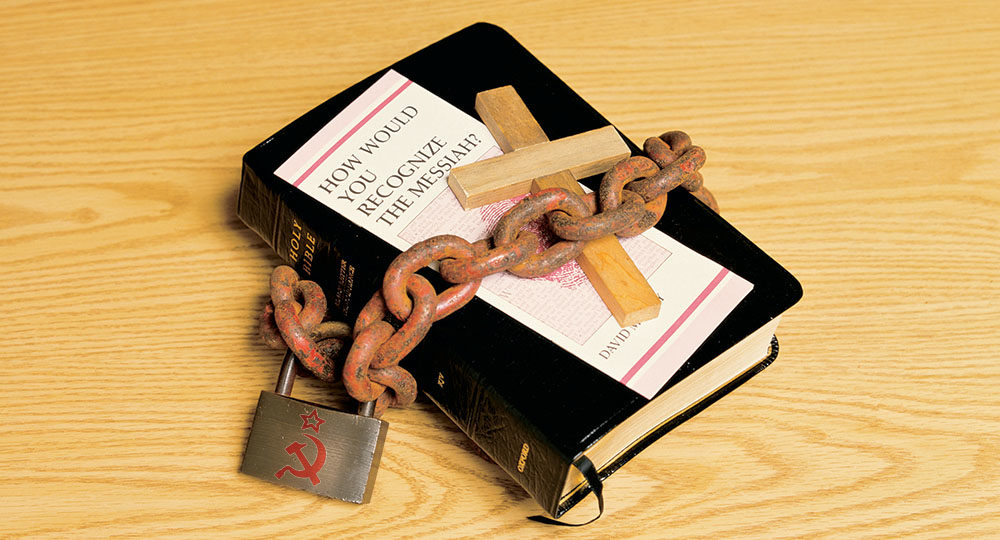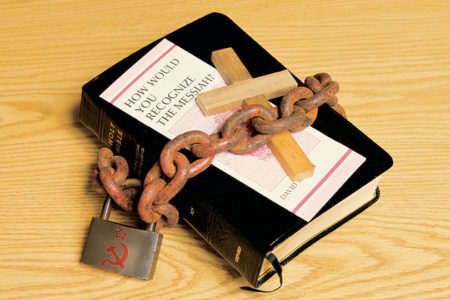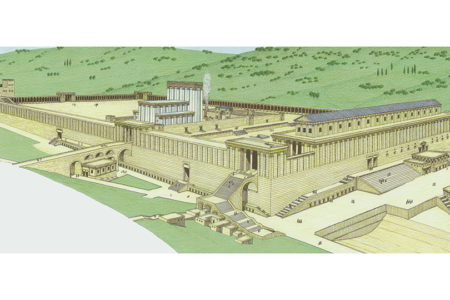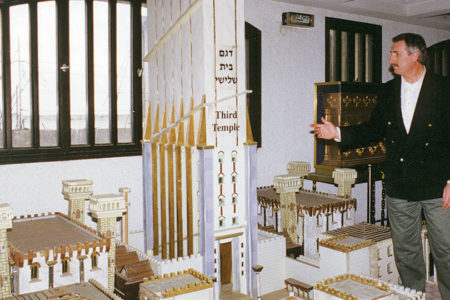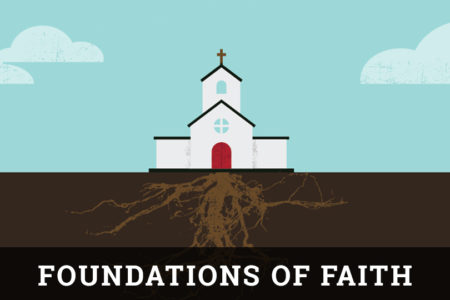My Brother’s Keeper?
And the Lᴏʀᴅ said unto Cain, Where is Abel, thy brother? And he said, I know not: am I my brother’s keeper? And he said, What hast thou done? The voice of thy brother’s blood crieth unto me from the ground (Gen. 4:9–10).
On September 26, 1997, Russian President Boris Yeltsin brought the curtain back down. With a single sweep of his pen, he consorted with the darkest elements in Russian society to snuff the lamp of religious freedom that had flickered tenuously since the fall of the Evil Empire.
The kisses were symbolic. Western media feeds showed Yeltsin and robed leaders of the Russian Orthodox Church exchanging embraces in celebration of the enactment of legislation designed to curtail religious freedom. The same TV sound bites carried evidence favoring the rationale for the decision by showing a group of shaven-headed cultists in bizarre apparel shaking strange objects and otherwise doing their thing on the streets of Moscow. We were supposed to get the message. Responsible religious leaders were ridding Russia of a religious plague. Henceforth, the church and its cohorts within the government will control who has access to the hearts, minds, and souls of the Russian people.
For me, the act was hauntingly reminiscent of a scene that had taken place in the Middle East a few weeks earlier. There, before the dust had settled over the carnage left by Muslim suicide bombers in the streets of Jerusalem, Yasser Arafat was publicly planting kisses on the cheeks of the monsters from Hamas who had sanctioned the attacks. I recognize that the Russians were not celebrating successes by mad bombers. They were, however, dignifying death of another kind—the death of freedom to disseminate religious faith within the boundaries of Russia.
Wolves on the Loose
We can be assured that there will be an overabundance of sheep’s clothing blanketing the “tough decisions” made by Yeltsin, Russian legislators, and Orthodox clerics. And, yes, there will be apologists here in the West who will plead that Russia’s rulers were only acting to protect their people from religious charlatans and self-promoting demigods. However, sheep’s clothing notwithstanding, the wolves are on the loose, and those opponents of freedom and faith will interpret the decision as open season on those who take propagating their beliefs seriously.
To think that evangelical Christians in minority sects in Russia will cease and desist from their activities is not worthy of serious discussion. For them, it will only mean a return to the days when the wall was up and atheism was violently in fashion. These churches will be forced to go underground and continue their worship in places beyond the gaze of the self-appointed guardians of the Russian soul. A very real problem, however, is that since the burst of freedom enjoyed over the past few years, these people are an easy-to-find, known entity—a fact that does not bode well for these believers.
There is another question that must be addressed as well. What will be the consequences of this legislation for the Jews who remain in the former Soviet Union? While the proclamation states that Judaism is a recognized religion, Jewish popularity will not be enhanced among the bureaucrats in the Kremlin or the robed emissaries of the Russian Orthodox Church. It must be remembered that these very same leaders conspired with Communists, rabid ultra-nationalists, and anyone else who would join their crusade to shut down evangelical activities. This is the same anti-Semitic cadre that imprisoned Jews of conscience and encouraged neo-Nazi types, like the Jew-hating Pamyat and their ilk.
All of this says that serious issues have been raised about what the new era of religious protectionism will mean to Russian Christians and Jews. Has the wolf—like Dolly, the new era sheep—been cloned into a kinder, gentler animal? Don’t count on it.
Shame On Us
What has taken place in Russia is, at one and the same time, a warning and a wake-up call: a warning of what’s ahead; a wake-up call to something we have paid scant attention to.
Evangelicals of this generation are faced with a serious charge, one that can no longer be ignored. The charge is the virtual silence of the church in view of the slaughter of hundreds of thousands of our brothers and sisters in what is becoming an international catastrophe. And it is not because the information is not available. It is.
Donald Hodel, President of the Christian Coalition, provides chilling statistics.
“More than 160,000 Christians were martyred in 1996 in a monumental escalation of religious persecution while the United States looked the other way…Today millions of people of faith around the world are being killed, tortured, raped, maimed, sold as slaves and more for no other reason than that they are Christians, Muslims, Jews or something else—in Sudan, 1.5 million Christians.
“More Christians have been killed in this century than in the 1900 years preceding it.”
Mr. Hodel’s remarks have been substantiated by scores of reliable sources, from independent human rights groups to agencies of the federal government. In spite of this, Christian pulpits and publications have been all but silent about the blood that is crying out to us.
The Voices of Those Who Have Been There
It should be noted—no, strongly emphasized—that among the most passionate voices to be heard on the issue of Christian persecution thus far have been those of Jewish writers and commentators. To our shame as evangelical Christians, many Jewish analysts seem to be much more aware of the peril slowly engulfing us than those who are committed to caring for fellow believers.
M. Rosenthal of the New York Times, quoted in the Jewish Interfaith Institute publication Explorations, comments:
“If I were a Christian I would complain that Christian leaders, political, religious and business, around the world have failed in their obligations to fight oppression of their co-religionists. I am complaining anyway.
“Nor do I think Jewish organizations have done nearly enough, although more are involved than I had first thought. The presidents of Jewish organizations in meetings with U.S. officials have denounced anti-Christian persecution in Islamic nations.”
After listing a number of suggestions to awaken Christians to the need to be heard by officials who can act against persecution, Rosenthal adds:
“Once awake, don’t fall asleep again.”
Michael Horowitz of the Hudson Institute, in his introduction to the book Their Blood Cries Out by Paul Marshall and Lela Gilbert, gives some perceptive Jewish thought on the issue of Christian persecution.
“The mounting persecution of Christians eerily parallels the persecution of Jews, my people, during much of Europe’s history. Today, minority Christian communities have become chosen scapegoats in radical Islamic and remnant Communist regimes, where they are demonized and caricatured through populist campaigns of hate and terror. As ever, shrewd tyrants understand that their survival depends on extinguishing the freedoms of communities that live beyond the reach of bribes and threats on which their power rests. Modern-day tyrants further understand that terrorizing the most vulnerable and innocent best helps them to achieve power over all.
“The silence and indifference of Western elites to the beatings, looting, torture, jailing, enslavement, murder, and even crucifixion of increasingly vulnerable Christian communities further engages my every bone and instinct as a Jew.”
Horowitz writes with the passion of a man who has stood close to the fire. In a sense, he has. His grandparents lived in the ghettoes of Poland; thus, he sees some of these things through their eyes. The same could be said of a host of Jewish observers who are alarmed over the atrocities and the seeming lack of concern by Christians who, for the present, are not themselves walking through the killing fields.
The Blood Cries Out
Perhaps evangelicals have been slow to hear about what is taking place because of our immersion in affluence and our perpetual saturation with self. I fear we’ve done our Lord and ourselves a terrible disservice by drawing the circle of our compassion too tightly around ourselves and our immediate families. They may speak other languages or have skin of a different color, but believers who suffer in the Sudan, China, or at the hands of Islamic fanatics in dozens of other settings are, after all, our next of kin in the faith. Thus, as surely as it was true in the case of Abel, their blood cries out before the face of the Lord. As certainly as it does, we can be sure that He will not hold us guiltless.
Cain’s response to the Lord’s inquiry should be heard. Possessed by his own estimate of what was worthy to place before the Lord, and inflamed by his own sense of pride and prominence, he replied, “Am I my brother’s keeper?” (Gen. 4:9).
He was.
But he never seemed to grasp that fact.
It is, I think, of little monument in the eyes of God whether we lift the instruments of destruction ourselves, as Cain did, or whether they are raised by those in places far removed from us. We are our brothers’ keepers. May God help us to see our brothers’ blood and hear their cries before other hands are lifted against us.
